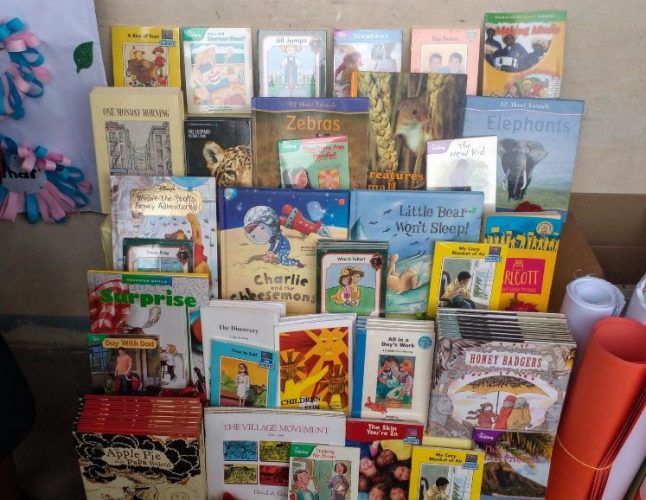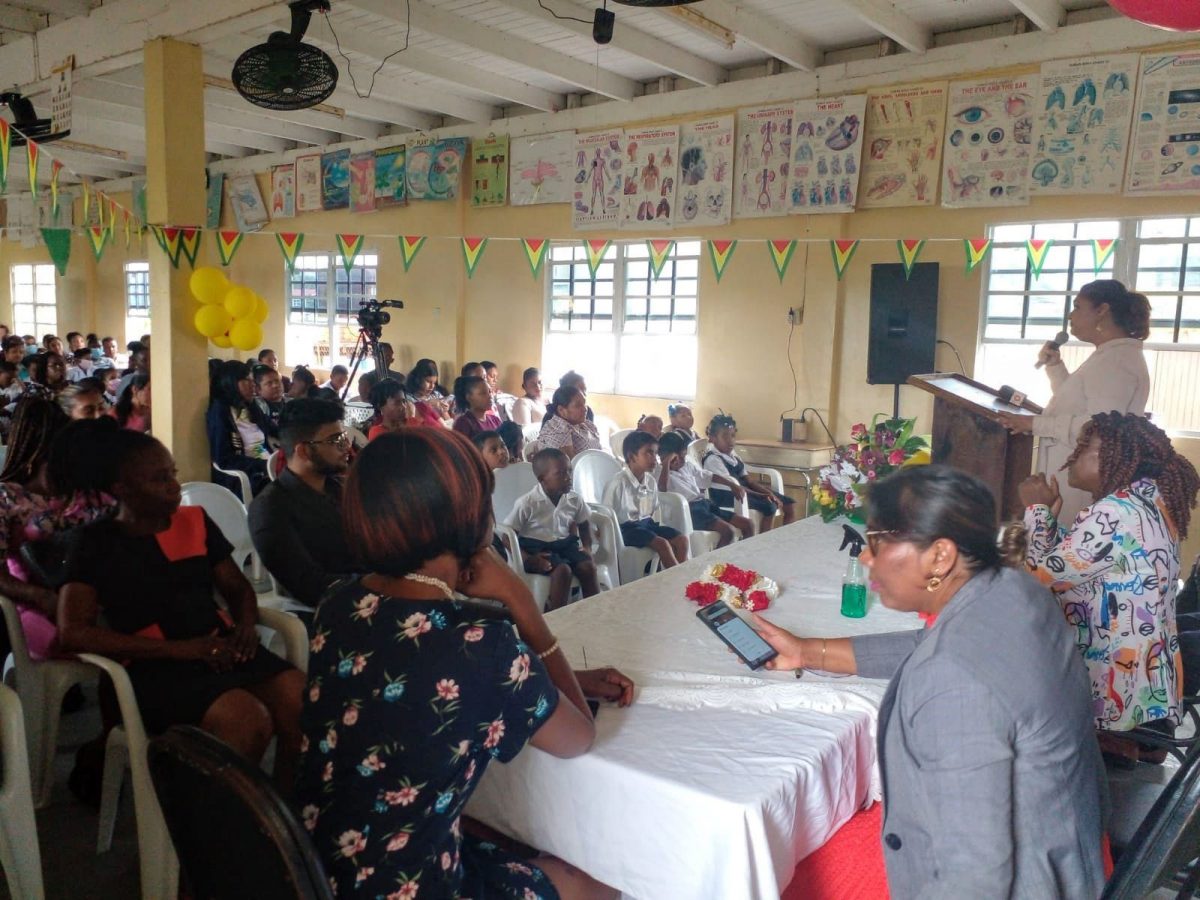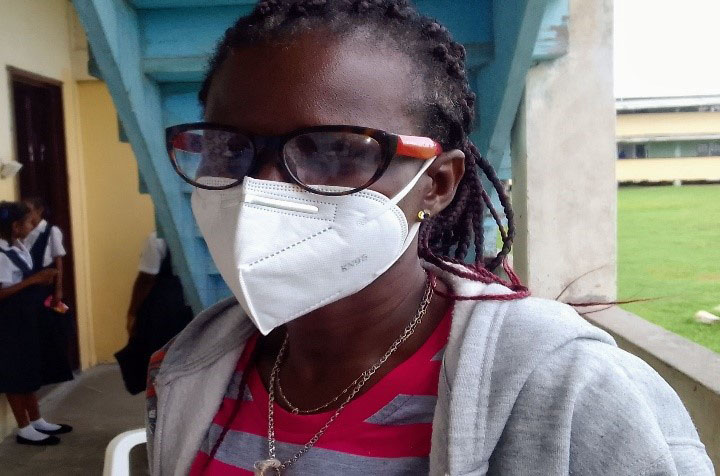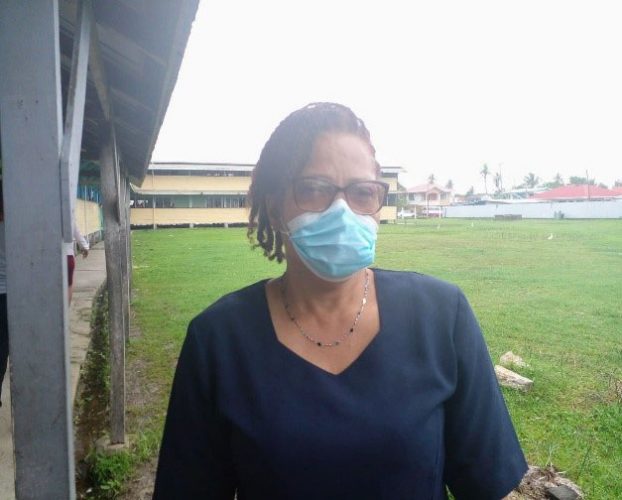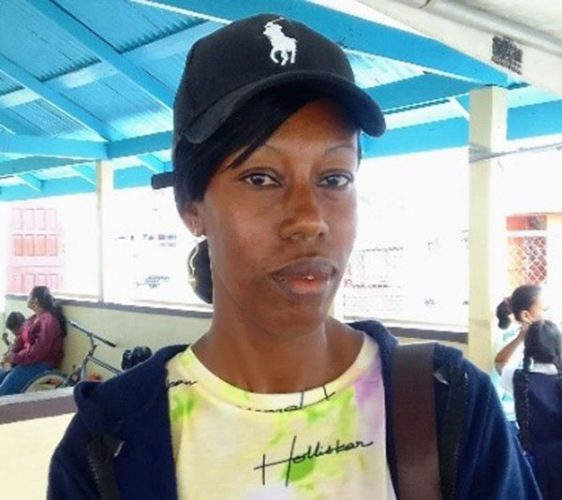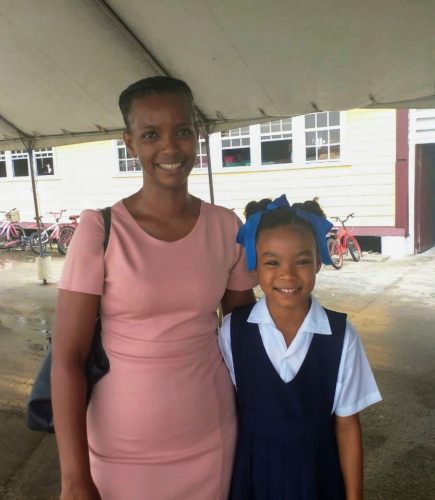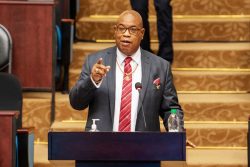By Shaniya Harding and Tanacia Karim
(Interns with the Guyana Media and Communication Academy)
From Monday, for the next six weeks, pupils of the Enterprise Primary School will do only reading interspersed with robotics and some play time as the Education Ministry continues a radical drive to lift literacy rates.
The programme is already underway in four Region Three schools and on Wednesday it premiered in Region Four.
“For the next six weeks all we will be focusing on is reading and reading alone,” were the words of the Minister of Education Priya Manickchand at the launch of the Literacy and Robotics Programme at the East Coast Demerara school. The programme is a collaboration between the National Literacy Department and the National Centre for Educational Resource Development (NCERD).
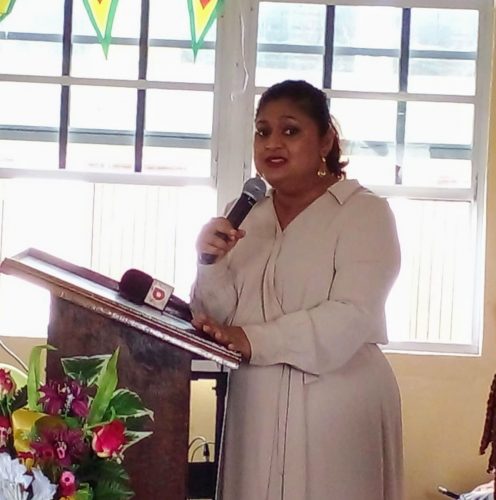
The issue of literacy is particularly troubling at the Enterprise Primary School. According to the Minister there are around 835 pupils with an estimated 750 in primary school and 80 in the primary tops. The primary school has 501 students who cannot read at their age level with 444 students at the basic level of reading, 48 students who are at level two and 16 at level three. The ministry plans to address this issue by dedicating six weeks out of this term on reading.
It will do this by distributing robotics kits, tablets and a curriculum to the school. Senior teachers will then be selected and trained to teach children literacy with the aid of the kits. During the course of the six weeks the children will be divided into groups of 4-5 where they will focus on learning new words, fractions, colours, directions and patterns as well as learning to build robots, coding and problem solving.
The initiative will encompass the entire school except for the students writing the National Grade Six Assessment (NGSA) and will commence on Monday. The ministry is looking to expand the programme nationwide beginning with grades four and five as well as the students waiting for exams by the end of May before turning their focus to grades one, two and three in September. The Minister also said the ministry would be closing the primary tops section of the school and relocating the older students to other secondary schools such as Good Hope Secondary upon its completion stating, “They need a high school by themselves. And we’re going to be able to do that because Good Hope Secondary is going to be completed shortly.”
She urged parents to remember the previous government’s failure to complete the Good Hope project and the various initiatives the current government is putting in place to make education more accessible to citizens stating, “Politics, political decisions, and policies made affect your life in very ordinary ways. That is why you have to get political. We have children who should be in a secondary school, sitting in a primary school with inadequate education. We’re going to be able to change that shortly. So I want you to make the connection. Political leadership matters to your life”, she asserted.
Manickchand went on to say that the ministry has tried a number of reading programmes in different schools around the country; and the “numbers still look bad”. So, in an effort to curb the low literacy levels she said , “So we’re going radical. I’m asking the school to stop doing everything else. All we teach for the next six weeks is reading, phonics, pronunciation, letter sounds. And because we know children can get saturated, we’re mixing it up with some robotics and play.”
In a response to the reservations of parents regarding teaching only reading for the period, the minister reassured them, saying that, “What we have found at Den Amstel is that (in) under six weeks, children who cannot pronounce twenty words on that sheet your children did; are now reading fluently.”
The literacy programme is currently in place at the Den Amstel, Kawall, La Retraite and Blankenburg primary schools in Region Three.
Manickchand then went on to answer questions from parents and grandparents. One of the first questions posed was by a grandparent, who asked the minister why the reading level was so low in the first place and how it can be fixed. The minister’s response was that the closure of schools for practically two years because of COVID-19 and online schooling played a role in the slow development of learning. “Even before COVID, 40% of your children at common entrance were unable to pass, with 50% or more”, she said.
Beverly Nichols, the grandparent of a 9-year- old child attending Enterprise Primary stated her worry on the consistency of the programme, saying that, “My narrative was, would it be that consistent to go forward, so at the time the other slow ones that are coming up would able to go forward with the same enthusiasm of learning or is the same initiative being endorsed going forward?”
In response to this the minister assured her that the programme will continue, stating that, “It is a programme that will be very consistent.” She went on to add that after the programme there will be concentrated literacy time with story books that the ministry is currently procuring and that from September every child from nursery school to A levels will have to produce a book report on a different book every month.
A teacher of the school raised the issue of the social and economic conditions of many children in her class saying, “Many of them are not fed properly, and if you are not fed properly you cannot focus, and they fall asleep.”
After stating that this is an issue that worries her, Manickchand then asked about the school’s Grade Six feeding programme and made mention of the biscuits and juice delivered to every school before adding that all children within the programme will be provided with biscuits and a drink.
Manickchand then added: “But I also want you to examine in your own homes and I’m not judging, because I know things could be very very hard sometimes. But is it true that you can’t afford food or is it really that your priorities need to be lined up a bit differently.” She then moved on saying that homes should realign their priorities, in ways such as having one less cell phone or using Wi-Fi over credit, or planting more in their backyard and “stop liming”.
A parent of Spanish-speaking children raised the issue of the language barrier to learning. She enquired if there were things in place to accommodate Spanish-speaking children writing the NGSA exam. And although she was met with some comments such as “go back”, Manickchand addressed her concerns and had a message for those people who thought the Spanish speakers should return to their countries.
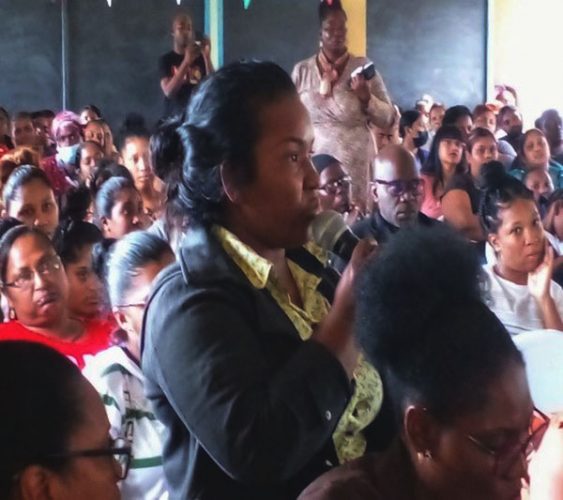
She said “We have just paid CXC to translate the paper to Spanish.” And in response to the comments made she said, “All of us have family overseas, many of them illegally. Many of them with twenty dollars sown into their hem. Because they could not take money out of the country, because of the regimen at the time. When we sent them away, other countries were kind to them …so bear that in mind, when I heard the `go back’ and so on. Bear that in mind, kindness is invaluable. The same way we’re asking teachers to be kind to your children, I am certain we can extend the kindness to the people who need us.”
The Headmistress of Enterprise Primary Shivan Daw when asked by Stabroek News about the initiative said: “I am excited about it, I appreciate it so much because we have an issue and to be honest I didn’t know how to deal with it.” She continued to emphasize the teachers’ willingness to work amidst the challenges they faced saying, “My teachers are on board, they are anxious to get it done but it’s frustrating, we’re ready to work, we teachers work here, we work but then it’s like our hands are tied.”
Odama Siland, a senior teacher at the Primary School also shared her thoughts with Stabroek News on the programme. “Well for me and I want to believe for all the teachers we are very much grateful so we have accepted the programme with great enthusiasm knowing that the children most of them that we have at our school are experiencing great problems in terms of their reading.”
She also touched on some other issues the school faces saying, “Apart from the problem with reading we do encounter problems in terms of space because we have children coming from various communities.”
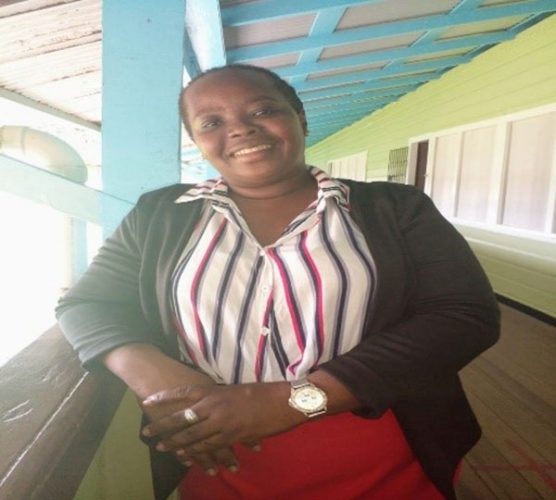
Siland hopes that with the primary tops they will have more space to house the students comfortably. She went on to say that while they have problems with space, heat and noise, “We are working … with the Minister of Education and the government at large to bring resolutions to all these little problems”. She said that she hopes the programme will ease some of the pressure off the teachers by working with children at their skill level and helping them progress at their own pace.
The issue of the Spanish-speaking students’ inability to fully understand their coursework is an ongoing one at the Enterprise Primary School. According to Siland there are approximately twenty Spanish-speaking children at the school and the language barrier has caused them to suffer significantly both socially and academically. She hopes that the government can put some systems into place to aid them in learning English and thinks that the decision to translate their CSEC into Spanish is a good step in that direction.
Odessa Moffatt, a parent of a child attending Enterprise Primary stated that, “The programme is very nice and I think it’s a very interesting one. And I think it will help a lot of children with reading because it’s true that a lot of children don’t know how to read. So I think it would help a great lot in the school.”
Among the other issues raised by one parent is the teaching of vocational subjects in schools. The minister went on to say that they are working to make vocational and technical subjects, not just a Plan B to those students who don’t excel at academics; but make it a first choice.“
Nadira Sookra, a mother of two children attending Enterprise Primary shared her thoughts saying, “From the moment I heard about the literacy programme I was actually happy, because I have my son in grade one and he doesn’t do that well in reading and I know it all has to do with literacy, phonics and the sounds of letters to get to there.”
She thought that while the teachers were trying their best their classrooms were overcrowded and they were lacking adequate resources. She also noted that it was extremely difficult to find after- school literacy programmes which is another reason she is grateful for the initiative and she hopes that the programme will help pupils have fun while learning.
Among the highlights of the presentation was the promise of two televisions by Manickchand. She assured the school and students that two televisions will be given to them and a request was also made for a projector.
